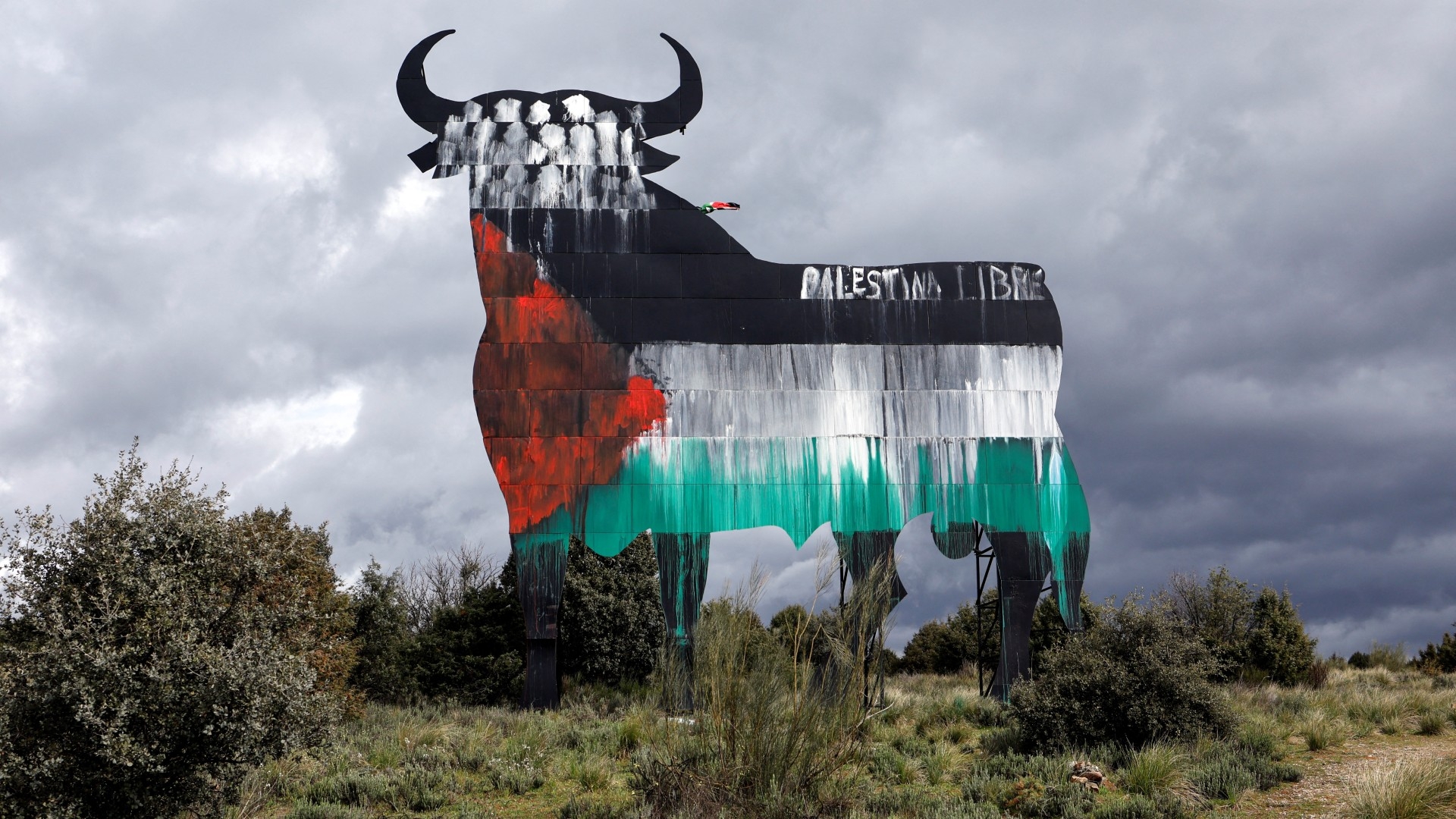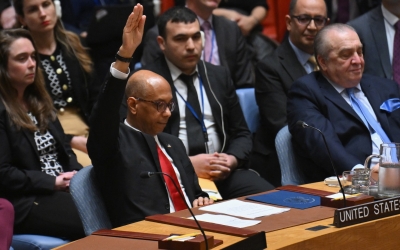These countries recognise Palestine as a state

Spain, Ireland and Norway announced on Wednesday that they will formally recognise a Palestinian state, joining over 140 United Nations member states that have recognised its statehood over the past four decades.
According to Irish Prime Minister Simon Harris, other European countries are expected to follow suit. In recent weeks, Slovenia and Malta have indicated that they plan to make the same move.
The vast majority of countries in Asia, Africa and South America recognise a Palestinian state.
In 1988, during the First Intifada, Palestinian Liberation Organisation (PLO) leader Yasser Arafat declared an independent Palestinian state that included the West Bank, the Gaza Strip and East Jerusalem, with East Jerusalem serving as its capital.
Under international law, the West Bank, Gaza and East Jerusalem have been occupied by Israel since 1967, as well as Syria's Golan Heights.
New MEE newsletter: Jerusalem Dispatch
Sign up to get the latest insights and analysis on Israel-Palestine, alongside Turkey Unpacked and other MEE newsletters
Arafat's declaration was immediately backed by several Arab states, and by the end of 1988, at least 84 countries had recognised Palestine, according to World Population Review.
That group mostly consisted of Middle Eastern, African and Asian states, as well as countries allied with the Soviet Union and members of the non-aligned movement.
Throughout the 1990s, a steady stream of countries recognised Palestinian statehood. Notably, South Africa joined in February 1995, months after Nelson Mandela won the first election following the end of apartheid.
Wave of recognition
The next wave of recognitions came in 2010 and 2011, when several countries, most of which were in South America and the Caribbean, responded to Palestinians' calls to endorse a statehood claim.
That group included Brazil, Chile, Paraguay, Uruguay, Peru, Argentina, Ecuador, Bolivia, Grenada and Dominica, among others.
In September 2011, Palestinian Authority President Mahmoud Abbas first applied for Palestinian membership in the UN.
The motion at the UN Security Council, which required nine votes in favour and no vetoes from permanent members, was defeated. It received 12 votes in favour, two abstentions - from the UK and Switzerland - and a veto by the United States.
The following year, after a 138-9 vote, with 41 abstentions, at the UN General Assembly, Palestine was granted non-member observer status.
Palestine and the Holy See are the only two states with observer status at the UN.
In 2014, Sweden became the second country in western Europe (after Iceland) to recognise Palestinian statehood and the first European U member to do so.
Israel was furious with Stockholm at the time. Then-Foreign Minister Avigdor Lieberman said: "Relations in the Middle East are a lot more complex than the self-assembly furniture of IKEA".
The EU's position, which is also held by other western countries such as the US and UK, is that Palestinian statehood should only come as part of a negotiated settlement with Israel.
Bulgaria, Cyprus, Czech Republic, Hungary, Malta, Poland, Romania and Slovakia all recognised Palestine in 1988 before becoming members of the EU.
Several of those countries have since rowed back on recognition, including Hungary and the Czech Republic, which recently voted against Palestine’s attempt to become a full UN member earlier this month.
The UN General Assembly’s vote on Palestine’s eligibility to become a full member on 10 May was approved by 143 countries, with nine voting against it and 25 abstaining.
The motion recognised that Palestine was qualified to join the UN as a full member and urged the Security Council to "reconsider the matter favourably", after the US vetoed full Palestinian membership last month.
Europe divided on recognition
Notably, France, Belgium, Denmark, Estonia, Greece, Luxembourg, Portugal, Slovenia and Malta - EU members that don't recognise Palestine - were among those to vote in favour of Palestine's UN membership attempts on 10 May.
Over half of the 50 or so countries who have yet to recognise a Palestinian state are in Europe.
In North America, the US and Canada are among those who have not made the recognition.
In Asia, Japan, Myanmar, and South Korea are among those not to recognise Palestine, while in Africa, only Cameroon and Eritrea don’t back Palestinian statehood.
In Oceania, Australia, New Zealand and several islands in the Pacific Ocean have not recognised Palestine.
Here's a full list of the countries which recognise Palestinian statehood, from first to most recent: Algeria, Bahrain, Indonesia, Iraq, Kuwait, Libya, Malaysia, Mauritania, Morocco, Somalia, Tunisia, Turkey, Yemen, Afghanistan, Bangladesh, Cuba, Jordan, Madagascar, Malta, Nicaragua, Pakistan, Qatar, Saudi Arabia, United Arab Emirates, Serbia, Zambia, Albania, Brunei, Djibouti, Mauritius, Sudan, Cyprus, Czech Republic, Slovakia, Egypt, Gambia, India, Nigeria, Seychelles, Sri Lanka, Namibia, Russia, Belarus, Ukraine, Vietnam, China, Burkina Faso, Comoros, Guinea, Guinea-Bissau, Cambodia, Mali, Mongolia, Senegal, Hungary, Cape Verde, North Korea, Niger, Romania, Tanzania, Bulgaria, Maldives, Ghana, Togo, Zimbabwe, Chad, Laos, Sierra Leone, Uganda, Congo, Angola, Mozambique, Sao Tome and Principe, Gabon, Oman, Poland, DR Congo, Botswana, Nepal, Burundi, Central African Republic, Bhutan, Rwanda, Ethiopia, Iran, Benin, Kenya, Equatorial Guinea, Vanuatu, Philippines, Eswatini, Kazakhstan, Azerbaijan, Turkmenistan, Georgia, Bosnia and Herzegovina, Tajikistan, Uzbekistan, Papua New Guinea, South Africa, Kyrgyzstan, Malawi, East Timor, Paraguay, Montenegro, Costa Rica, Lebanon, Ivory Coast, Venezuela, Dominican Republic, Brazil, Argentina, Bolivia, Ecuador, Chile, Guyana, Peru, Suriname, Uruguay, Lesotho, South Sudan, Syria, Liberia, El Salvador, Honduras, Saint Vincent and the Grenadines, Belize, Dominica, Antigua and Barbuda, Grenada, Iceland, Thailand, Guatemala, Haiti, Sweden, Saint Lucia, Colombia, St Kitts and Nevis, Mexico, Barbados, Jamaica, Trinidad and Tobago, The Bahamas, Norway, Spain and Ireland.
Middle East Eye delivers independent and unrivalled coverage and analysis of the Middle East, North Africa and beyond. To learn more about republishing this content and the associated fees, please fill out this form. More about MEE can be found here.





